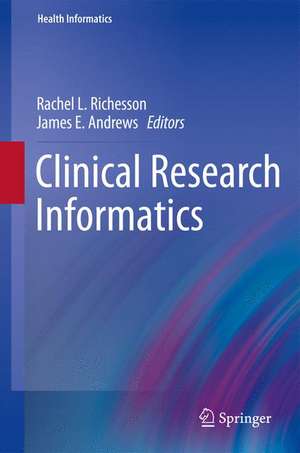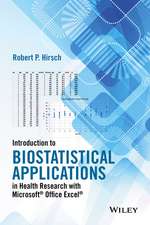Clinical Research Informatics: Health Informatics
Editat de Rachel Richesson, James E. Andrewsen Limba Engleză Hardback – 15 feb 2012
| Toate formatele și edițiile | Preț | Express |
|---|---|---|
| Paperback (1) | 602.28 lei 38-45 zile | |
| SPRINGER LONDON – 27 aug 2013 | 602.28 lei 38-45 zile | |
| Hardback (1) | 793.07 lei 6-8 săpt. | |
| SPRINGER LONDON – 15 feb 2012 | 793.07 lei 6-8 săpt. |
Din seria Health Informatics
- 5%
 Preț: 429.40 lei
Preț: 429.40 lei - 5%
 Preț: 458.30 lei
Preț: 458.30 lei - 5%
 Preț: 326.78 lei
Preț: 326.78 lei - 5%
 Preț: 418.60 lei
Preț: 418.60 lei - 5%
 Preț: 353.44 lei
Preț: 353.44 lei - 5%
 Preț: 787.58 lei
Preț: 787.58 lei - 5%
 Preț: 1038.14 lei
Preț: 1038.14 lei - 5%
 Preț: 269.08 lei
Preț: 269.08 lei - 5%
 Preț: 488.26 lei
Preț: 488.26 lei - 5%
 Preț: 570.44 lei
Preț: 570.44 lei - 5%
 Preț: 404.76 lei
Preț: 404.76 lei - 5%
 Preț: 342.02 lei
Preț: 342.02 lei - 5%
 Preț: 416.37 lei
Preț: 416.37 lei - 5%
 Preț: 384.04 lei
Preț: 384.04 lei - 5%
 Preț: 341.47 lei
Preț: 341.47 lei - 5%
 Preț: 385.01 lei
Preț: 385.01 lei - 5%
 Preț: 363.07 lei
Preț: 363.07 lei - 5%
 Preț: 735.46 lei
Preț: 735.46 lei - 5%
 Preț: 769.80 lei
Preț: 769.80 lei -
 Preț: 384.86 lei
Preț: 384.86 lei - 5%
 Preț: 727.44 lei
Preț: 727.44 lei - 5%
 Preț: 719.74 lei
Preț: 719.74 lei - 5%
 Preț: 724.14 lei
Preț: 724.14 lei - 5%
 Preț: 649.68 lei
Preț: 649.68 lei - 5%
 Preț: 723.21 lei
Preț: 723.21 lei - 5%
 Preț: 589.18 lei
Preț: 589.18 lei - 5%
 Preț: 1104.48 lei
Preț: 1104.48 lei - 5%
 Preț: 366.70 lei
Preț: 366.70 lei - 5%
 Preț: 905.70 lei
Preț: 905.70 lei - 5%
 Preț: 717.00 lei
Preț: 717.00 lei - 5%
 Preț: 1122.94 lei
Preț: 1122.94 lei - 5%
 Preț: 731.80 lei
Preț: 731.80 lei - 5%
 Preț: 776.78 lei
Preț: 776.78 lei - 5%
 Preț: 844.27 lei
Preț: 844.27 lei - 5%
 Preț: 1102.10 lei
Preț: 1102.10 lei - 5%
 Preț: 380.25 lei
Preț: 380.25 lei - 5%
 Preț: 720.84 lei
Preț: 720.84 lei - 5%
 Preț: 771.30 lei
Preț: 771.30 lei - 5%
 Preț: 717.73 lei
Preț: 717.73 lei - 5%
 Preț: 388.48 lei
Preț: 388.48 lei - 5%
 Preț: 423.84 lei
Preț: 423.84 lei - 5%
 Preț: 724.50 lei
Preț: 724.50 lei
Preț: 793.07 lei
Preț vechi: 834.80 lei
-5% Nou
Puncte Express: 1190
Preț estimativ în valută:
151.75€ • 158.44$ • 125.60£
151.75€ • 158.44$ • 125.60£
Carte tipărită la comandă
Livrare economică 04-18 aprilie
Preluare comenzi: 021 569.72.76
Specificații
ISBN-13: 9781848824478
ISBN-10: 1848824475
Pagini: 392
Ilustrații: IX, 419 p.
Dimensiuni: 155 x 235 x 23 mm
Greutate: 0.77 kg
Ediția:2012
Editura: SPRINGER LONDON
Colecția Springer
Seria Health Informatics
Locul publicării:London, United Kingdom
ISBN-10: 1848824475
Pagini: 392
Ilustrații: IX, 419 p.
Dimensiuni: 155 x 235 x 23 mm
Greutate: 0.77 kg
Ediția:2012
Editura: SPRINGER LONDON
Colecția Springer
Seria Health Informatics
Locul publicării:London, United Kingdom
Public țintă
ResearchCuprins
Section I: Contexts of Clinical Research Informatics.- Introduction to Clinical Research Informatics.- From Notations to Data: The Digital Transformation of Clinical Research.- Clinical Research Environment. - Statistical and Study Design Foundations of Clinical Research.- Informatics Approaches to Participant Recruitment.- The Evolving Role of Consumers.- Clinical Research in the Post-Genomic Era.- Section II: Data Management and Systems in Clinical Research.- Clinical Research Information Systems.- Study Protocol Representation.- Data Quality in Clinical Research.- Patient-Reported Outcome Data.- Biobanking Challenges and Informatics Opportunities.- Patient Registries.- Section III: Knowledge Representation and Discovery.- Knowledge Representation and Ontologies.- Non-hypothesis Driven Research: Data Mining and Knowledge Discovery.- Natural Language Processing, Electronic Health Records, and Clinical Research.- Section IV: The Future of Clinical Research, Health, and Clinical Research Informatics.- Data Sharing: Electronic Health Records and Research Interoperability.- Standards Development and the Future of Research Data Sources, Interoperability, and Exchange.- Pharmacovigilance.- Clinical Trials Registries and Results Databases.- Future Directions in Clinical Research Informatics.- Index.
Notă biografică
Rachel Richesson, MS, PhD, MPH, FACMI, a noted informaticist, joined the Duke University School of Nuring in December 2011. Dr. Richesson earned her BS (Biology) at the University of Massachusetts in 1991, and holds graduate degrees in Community Health (MPH, 1995) and Health Informatics (MS, 2000 and PhD, 2003) from the University of Texas Health Sciences Center in Houston. Dr. Richesson spent 7 years as at the University of South Florida College of Medicine directing strategy for the identification and implementation of data standards for a variety of multi-national multi-site clinical research and epidemiological studies housed within the USF Department of Pediatrics, including the NIH Rare Diseases Clinical Research Network (RDCRN) and The Environmental Determinants of Diabetes in the Young (TEDDY) study.
Dr Andrews is the Director of the University of South Florida, School of Information, and an Associate Professor of Information Science. His research falls broadly within the interdisciplinary field of health informatics. He has specific interests in clinical research informatics, as well as health-related information behaviours, particularly in the context of cancer genetics. He works collaboratively with researchers from USF Health, within SI, and also across the US and internationally.
Dr Andrews is the Director of the University of South Florida, School of Information, and an Associate Professor of Information Science. His research falls broadly within the interdisciplinary field of health informatics. He has specific interests in clinical research informatics, as well as health-related information behaviours, particularly in the context of cancer genetics. He works collaboratively with researchers from USF Health, within SI, and also across the US and internationally.
Textul de pe ultima copertă
Clinical research informatics (CRI) is the application of informatics principles and techniques to support the spectrum of activities and business processes that instantiate clinical research. Informatics, defined generally as the intersection of information and computer science with a health-related discipline, has a foundation drawn from many well-established, theory-based disciplines, including computer science, library and information science, cognitive science, psychology, and sociology. The newly articulated yet fundamental theorem of informatics states that information technology should be used to enable humans to function and perform better together than humans alone, and so informatics is a source for supportive technologies and tools that enhance – but not replace – unreservedly human processes.
Clinical Research Informatics contributes to the ongoing dialogues among researchers and practitioners in CRI as they continue to rise to the challenges of a dynamic and evolving clinical research environment. The development of CRI as a sub-discipline of informatics, and as an independent/maturing professional practice area in its own right, drives a growing pool of scientific literature based on original CRI research, and high-impact tools and systems will be developed. CRI leaders and stakeholder groups will continue to support and create communities of discourse that will address much needed practice standards in CRI, improved safety and efficiencies in clinical research, data standards in clinical research, policy issues, educational standards and instructional resources.
The Editors and contributors to this book are among the most active and engaged in the CRI domain and provide an excellent primer for deeper explorations into this emerging discipline. Certain themes are highlighted, including the changing role of the consumer, movement toward transparency, growing needs for global coordination and cooperation on many levels, and the merging together of clinical care delivery and research as part of a changing paradigm in global healthcare delivery – all in the context of rapid innovations in technology and explosions of data sources, types, and volume. This book is therefore of considerable interest to all students of biomedical informatics, from the newcomer to the professional informatician.
Clinical Research Informatics contributes to the ongoing dialogues among researchers and practitioners in CRI as they continue to rise to the challenges of a dynamic and evolving clinical research environment. The development of CRI as a sub-discipline of informatics, and as an independent/maturing professional practice area in its own right, drives a growing pool of scientific literature based on original CRI research, and high-impact tools and systems will be developed. CRI leaders and stakeholder groups will continue to support and create communities of discourse that will address much needed practice standards in CRI, improved safety and efficiencies in clinical research, data standards in clinical research, policy issues, educational standards and instructional resources.
The Editors and contributors to this book are among the most active and engaged in the CRI domain and provide an excellent primer for deeper explorations into this emerging discipline. Certain themes are highlighted, including the changing role of the consumer, movement toward transparency, growing needs for global coordination and cooperation on many levels, and the merging together of clinical care delivery and research as part of a changing paradigm in global healthcare delivery – all in the context of rapid innovations in technology and explosions of data sources, types, and volume. This book is therefore of considerable interest to all students of biomedical informatics, from the newcomer to the professional informatician.
Caracteristici
Detailed focus on clinical research informatics without being diverted into areas covering actual clinical practice Extensive coverage of the intersection between clinical research, data standards, and information science
Descriere
Descriere de la o altă ediție sau format:
This book provides foundational coverage of key areas, concepts, constructs, and approaches of medical informatics as it applies to clinical research activities, in both current settings and in light of emerging policies. The field of clinical research is fully characterized (in terms of study design and overarching business processes), and there is emphasis on information management aspects and informatics implications (including needed activities) within various clinical research environments.
The purpose of the book is to provide an overview of clinical research (types), activities, and areas where informatics and IT could fit into various activities and business practices. This book introduces and applies informatics concepts only as they have particular relevance to clinical research settings.
This book provides foundational coverage of key areas, concepts, constructs, and approaches of medical informatics as it applies to clinical research activities, in both current settings and in light of emerging policies. The field of clinical research is fully characterized (in terms of study design and overarching business processes), and there is emphasis on information management aspects and informatics implications (including needed activities) within various clinical research environments.
The purpose of the book is to provide an overview of clinical research (types), activities, and areas where informatics and IT could fit into various activities and business practices. This book introduces and applies informatics concepts only as they have particular relevance to clinical research settings.



















